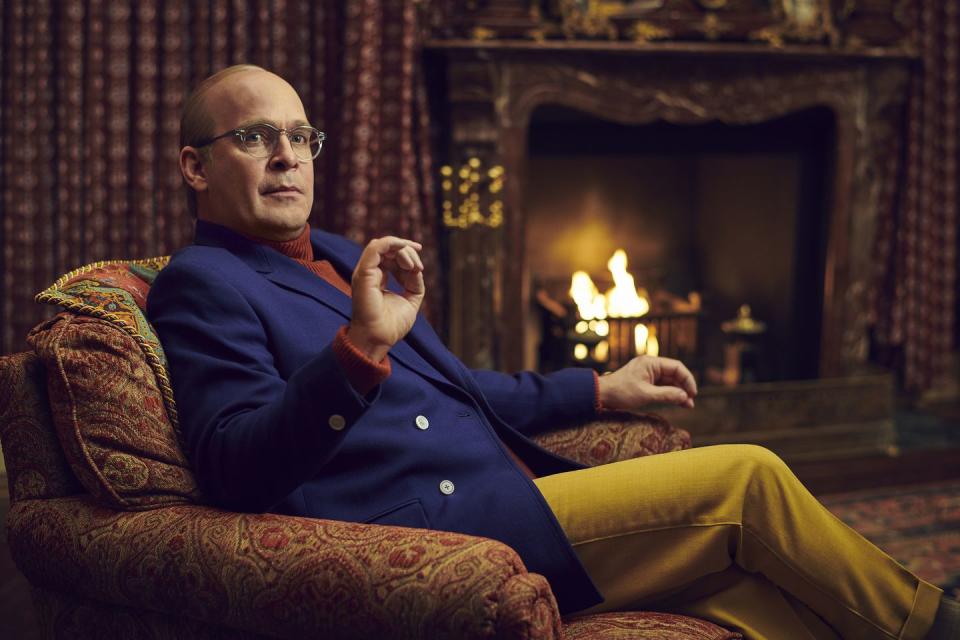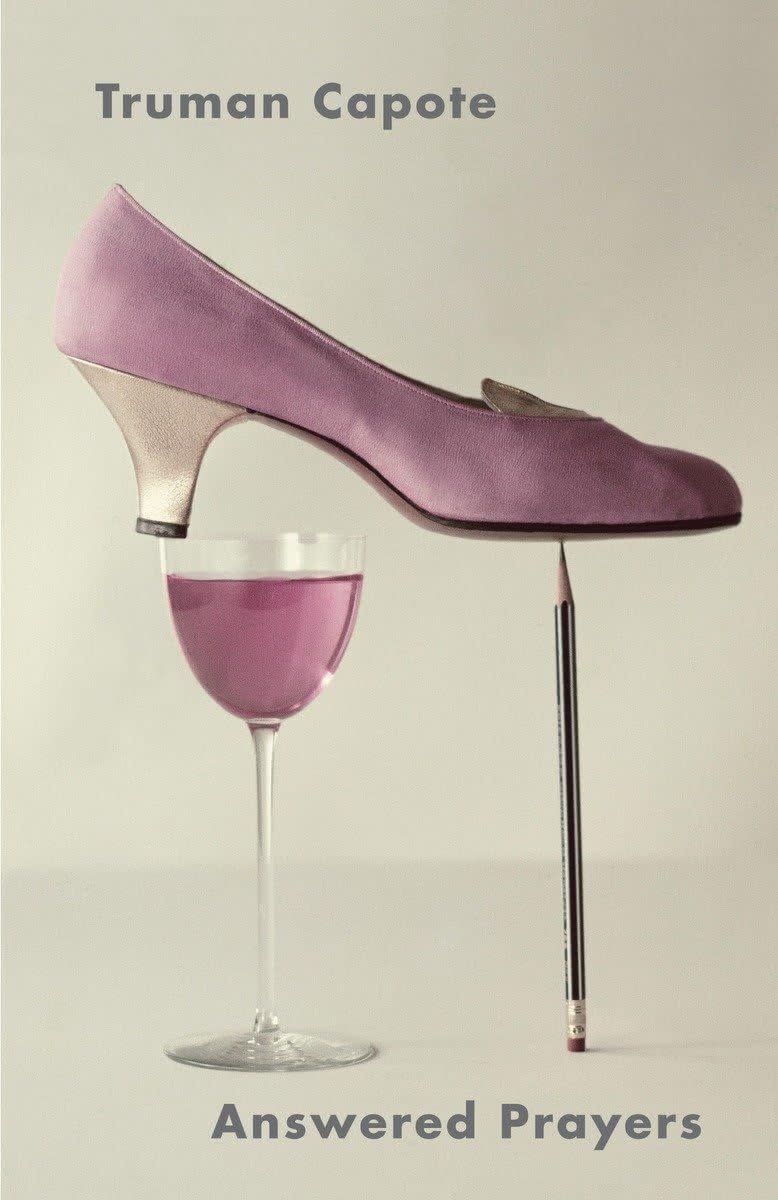Tom Hollander Knows Why Truman Capote Still Matters

"Hearst Magazines and Yahoo may earn commission or revenue on some items through these links."
The first time I watched Feud: Capote vs. The Swans, I couldn’t stop thinking about one thing: the high-pitched squeal that echoed through my television. Dainty, yet impossibly loud. Demure, but commanding. I heard witty quips like, “Never let the truth get int he way of a good story!” Also: “I’m famous for my discretion!”
It was perfect. The voice belonged to Truman Capote, brought to life by the great Tom Hollander—who, by the way, spent weeks perfecting that “creaky voice.” "We broke it down to syllable noises and consonants," Hollander, 56, tells me over Zoom. He calls from his home in the English countryside, just a stone's throw away from Lee Radzwill's former estate. “Apparently, Capote went to stay in that house and trashed the guest room,” he says, laughing.
It’s one of the many anecdotes Hollander discovered while preparing to play Capote—who, in 1975, published a jaw-dropping short story in Esquire that would change the course of his life. “La C?te Basque, 1965” included secrets about Capote’s glamorous friends, whom he dubbed The Swans. In a brash move, he even named the excerpt after the now-defunct New York restaurant where they held court.
Now, Capote’s fall has been Ryan Murphy-ified in Feud, which debuted its season finale this Wednesday night. It’s been a long road for Hollander, who, after landing the role, watched all of Capote’s televised interviews and read his novels. His thoughts on “Breakfast at Tiffany's?” "I loved it." In Cold Blood, House of Flowers, and Music for Chameleons? Incredible. But when Hollander got around to "La C?te Basque," well… I’ll let him say it. "I thought… ew,"
“I really loved his [other] writing,” Hollander explains. “They were all so sensitive and magical and charming. They were about people who were outsiders. People who were disenfranchised. “La C?te Basque” was just mean.”
Capote’s friends thought so, too. The story was wildly successful, but the Swans (played by Naomi Watts, Diane Lane, and Chlo? Sevigny in Feud, among others) never forgave him for it. After reading “La C?te Basque,” they made it their mission to cast Capote out of New York’s high society—which serves as the basis for Feud. “That’s why it went so badly for him,” Hollander says. “If he’d been writing at his best, they might have let him get away with it, because they would have been so flattered by the beauty of the story. But it wasn’t so good. The heart was not in it.”
Following Feud’s season finale, Hollander opens up about Capote’s complicated legacy, why he betrayed The Swans, and if the writer should’ve regretted his actions.
This interview has been condensed and edited for clarity.

ESQUIRE: Now that I've finished the series, I keep debating why Capote was so… angry. I still don’t quite understand what his spite for The Swans was rooted in.
TOM HOLLANDER: There are some potential answers in episode 5, which is the episode with James Baldwin. He specifically describes his status in the room [of Swans] and how he’s one up from [wait] staff. As a gay man, he’s welcome at the table as the court jester, but because of homophobia, he’s not really accepted.
He was a little bit of a castle creeper—it’s a British expression. An eternal house guest who has to sing for their supper. That person sometimes can’t quite face coming out of their bedroom because they know they’ve got to turn it on. And if they don’t, then who are they? Whereas the person who owns the castle doesn’t really have to do anything but open the door.
Why do you think he kept putting himself in positions where he’d feel so lonely?
I think he always felt lonely. He was abandoned as a four-year-old and left in a house with a distant cousin. Loneliness was the air he breathed. You and I might feel like, why am I putting myself in this position? Whereas he only ever knew that. He was a fighter—a little warrior.
In the finale, we go back in time to see Truman attempt to finish Answered Prayers. He never does. Why do you think that is?
I don't know the answer, of course—but what I imagine is that he talked about it too much. Another reason is that I don’t think he actually knew how to write it. He thought it was a good idea. It suited his grandiosity to do this homage; it sounded brilliant and as grand as he wanted it to be.
But I don’t think he knew how to do it because he’s better at writing about the marginalized. He’s better at writing about outsiders, not the fancy insiders or the privileged in their mansions. Maybe on some deep level, he didn’t really identify with them. So he couldn’t write about them eloquently.
Also, he was an alcoholic. It was progressive, so it was getting worse, and as time went on, he was less likely to write anything at all.

I wonder if his conscience played a role in that, too. Do you think Truman was ever truly sorry for writing “La C?te Basque, 1965?”
Well, he says in the show, “As an artist, I don’t have to be sorry.” As a human, I’m sure he regretted it—but whether he really thought he had something to apologize for—or whether he just regretted the fact that they didn’t talk to him anymore—is hard to know. It’s the difference between I’m sorry and I’m sorry you feel that way.
I don’t know which one [is true], but I know he ended up a sad man. There was an art critic named John Richardson, who was Picasso's biographer. He described seeing Capote walking up 34th Street or something, right toward the end, carrying two plastic bags with alcohol in them. He said Truman Capote was wearing a raincoat, just shuffling along.
John reached out and said, “Come in, Truman, come in.” And he just drank. He literally just drank neat alcohol, like a pint of it. Then he said goodbye and kept going. It was as dark as you could imagine.
I want to leave you with a lighter final question. The series has a fantastic ensemble cast. Did you and your castmates have any Swans-y moments together off-set?
You’re going to be so disappointed, but no. It was quite an intense working atmosphere. We looked like the Swans, we looked like that world, and we embodied it. But mostly, what we did was try to connect in a way that made us all feel human together.
There was very little socializing because of COVID protocols. We eventually had one dinner, which I organized. We had dinner in The Village, and everyone came. All the Swans came, but it was not swan-like at all. Nobody was made up; no one had fancy hair. We just sat there having fun and telling stories. That was our La C?te Basque.
You Might Also Like